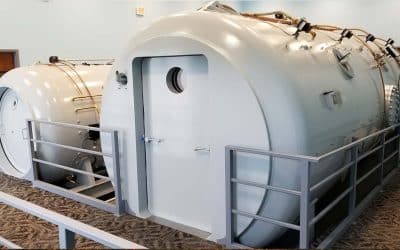Abstract Neuroinflammation is believed to be one of the primary causes of cognitive impairment. Previous studies showed that the antioxidant vitamin C (Vit C) performs many beneficial functions such as immunostimulant and anti-inflammatory actions, but its role in...
Brain Damage
Hyperbaric Oxygen Therapy (HBOT) Research for Brain Damage.
Clinical and Biochemical Outcomes Following EEG Neurofeedback Training in Traumatic Brain Injury in the Context of Spontaneous Recovery
Abstract It has been found that reduction of posttraumatic stress symptoms is positively associated with the reduction of postconcussive symptoms. Cortisol is commonly used as a biomarker of stress. Understanding the role of posttraumatic stress and cortisol in...
Effect of hyperbaric oxygen therapy on chronic neurocognitive deficits of post-traumatic brain injury patients: retrospective analysis.
The aim of the study is to evaluate the effect of hyperbaric oxygen therapy (HBOT) in participants suffering from chronic neurological deficits due to traumatic brain injury (TBI) of all severities in the largest cohort evaluated so far with objective cognitive function tests and metabolic brain imaging. A retrospective analysis was conducted of 154 patients suffering from chronic neurocognitive damage due to TBI, who had undergone computerised cognitive evaluations pre-HBOT and post-HBOT treatment. The average age was 42.7-14.6 years, and 58.4% were men. All patients had documented TBI 0.3-33 years (mean 4.6-5.8, median 2.75 years) prior to HBOT. HBOT was associated with significant improvement in all of the cognitive domains, with a mean change in global cognitive scores of 4.6-8.5 (p<0.00001).
Predictors of mortality after extracorporeal cardiopulmonary resuscitation.
Abstract: Extracorporeal membrane oxygenation (ECMO) is a promising adjunct to cardiopulmonary resuscitation (CPR) in refractory cardiac arrest (CA). Factors associated with outcome are incompletely characterised. The aim of our study was to identify pre-ECMO factors...
Hyperbaric oxygen therapy to improve cognitive dysfunction and encephalatrophy induced by NO for recreational use: a case report.
NO, or laughing gas, is generally used for anesthesia, especially in stomatology and pediatrics but is also commonly used recreationally. Cognitive dysfunction induced by the recreational use of NO is rare. Here, we present the case of an 18-year-old female with a history of having used NO recreationally for 5 months who suffered from encephalatrophy and severe cognitive dysfunction. All of the symptoms gradually subsided with ~20 days of treatment by hyperbaric oxygenation. We hypothesize that the long-term use of NO may have induced a chronic state of systemic hypoxia that further induced cerebral atrophy with impaired cognitive function. Hyperbaric oxygen therapy (HBOT) is reported here for the first time as an important therapeutic element for treating NO toxicity due to recreational use.
Drowning in fresh or salt water: respective influence on respiratory function in a matched cohort study.
Abstract: For the most severe drowned patients, hypoxemia represents one of the major symptoms. As the influence of the type of water (fresh or salt water) on respiratory function is still unclear, the primary endpoint of this multicenter study was to compare...
Sirt1 mediates improvement of isoflurane-induced memory impairment following hyperbaric oxygen preconditioning in middle-aged mice.
Abstract: Hyperbaric oxygen (HBO) preconditioning (PC) has been suggested as a feasible method to provide neuroprotection from postoperative cognitive dysfunction (POCD). However, whether HBO-PC can ameliorate cognitive deficits induced by isoflurane, and the possible...
Evidence brief: hyperbaric oxygen therapy (HBOT) for traumatic brain injury and/or post-traumatic stress disorder.
This report is a product of the VA Evidence-based Synthesis Program. The purpose is to provide “timely and accurate syntheses of targeted healthcare topics. to improve the health and healthcare of Veterans”. The authors have made a comprehensive search and analysis of the literature and make recommendations to assist clinicians in dealing with veterans suffering from either traumatic brain injury (TBI) or post-traumatic stress disorder (PTSD). The report is timely and of great potential impact given the vigorous and lengthy debate among hyperbaric physicians and lay people determined to find an answer for the large numbers of veterans deeply affected with some combination of PTSD and post-concussion dysfunction.
HYPERBARIC OXYGEN THERAPY- BASICS AND NEW APPLICATIONS
Hyperbaric oxygen therapy (HBOT) serves as primary or adjunctive therapy for a diverse range of medical conditions. The indication for HBOT can be related to either pressure (decompression sickness or air emboli) or tissue hypoxia. It is now realized, that the combined action of hyperoxia and hyperbaric pressure, leads to significant improvement in tissue oxygenation while targeting both oxygen and pressure sensitive genes, resulting in improved mitochondrial metabolism with anti-apoptotic and anti-inflammatory effects. Clinical studies published in recent year’s present convincing evidence that HBOT can be the coveted neurotherapeutic method for brain repair. Here we discuss the multi-faceted role of HBOT in wound care in general and in neurotherapeutics in detail.



